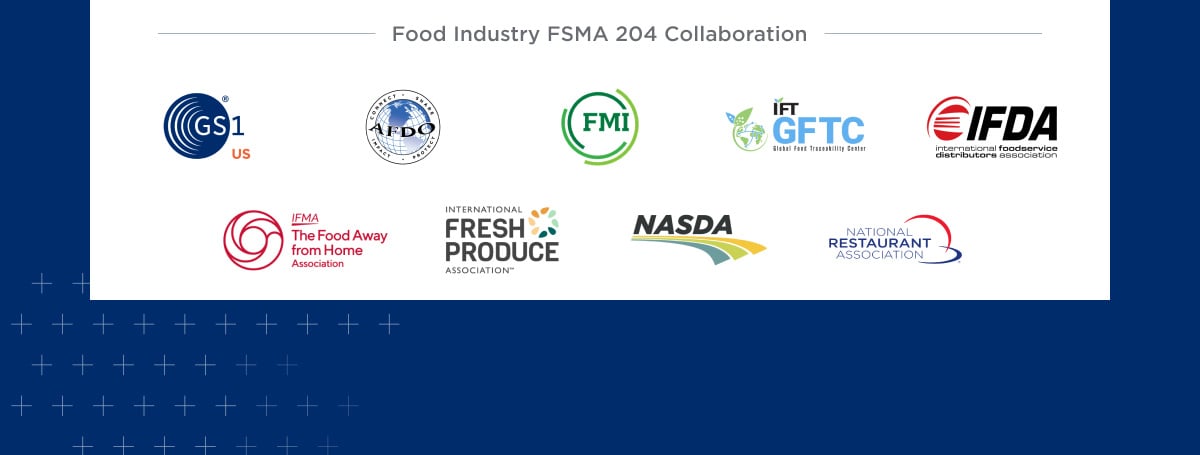
A unified approach that aims to improve food safety and meet Traceability Rule requirements.
Eight leading food industry organizations have united to form the Food Industry FSMA 204 Collaboration to enhance industry-wide awareness of the U.S. Food and Drug Administration’s (U.S. FDA’s) Food Traceability Rule, which implements Section 204(d) of the U.S. FDA Food Safety Modernization Act (FSMA). The FSMA Rule 204 mandates a comprehensive tracking and tracing system for certain high-risk foods listed on the U.S. FDA's Food Traceability List (FTL), including fresh produce and leafy greens, deli salads, certain types of seafood, and more. The Collaboration provides a forum where business and government officials can come together to educate industry and potentially help ease the burden of compliance.

Our monthly industry forum is designed for professionals impacted by the Food Safety Modernization Act (FSMA) Rule 204 requirements. This webinar series features experts from the member associations of the Food Industry FSMA 204 Collaboration, providing an overview of key topics, answering your questions, and sharing valuable resources to help you navigate these important regulatory requirements.
If you missed the opportunity to watch live, catch up at your convenience—watch the webinars on-demand now and stay informed.

The Association of Food and Drug Officials (AFDO) is a well-recognized national organization that represents state, territorial, and local food protection regulatory agencies including all the agencies that regulate produce, manufactured foods, and retail foods. The Association’s principal purpose is to act as the leader and a resource to state, territorial, and local regulatory agencies in developing strategies to resolve and promote public health and consumer protection related to the regulation of food, medical products, and cosmetics.
AFDO members are officials from federal, state, territorial, and local regulatory agencies that administer these programs in conjunction and collaboration with FDA. Although industry associate members can join AFDO, the organization is very unique in that only government regulatory officials can vote on matters addressed by the association. Unlike other organizations, this gives AFDO a unique perspective on the infrastructure, capacity, strengths, and needs of state and local food protection programs. Further AFDO works on issues related to food, medical products, and cosmetics and has subject matters experts available in all disciplines related to FDA regulated products. AFDO has a strong history dating back to 1896 of collaborating with other organizations including associations, nonprofits, universities, and industry.

As the food industry association, FMI works with and on behalf of the entire industry to advance a safer, healthier and more efficient consumer food supply chain. FMI brings together a wide range of members across the value chain — from retailers that sell to consumers, to producers that supply food and other products, as well as the wide variety of companies providing critical services — to amplify the collective work of the industry.

GS1 US® enables companies to power their supply chains to deliver safe, consistent, authentic, and trusted experiences. Best known as a source for UPC barcodes, GS1 is a not-for-profit, global data standards organization that creates a common language for companies to identify, capture, and share trusted data that links their physical and digital supply chains. Millions of businesses around the world power commerce with GS1 Standards.
.jpg?width=466&height=200&name=0622_GFTC%20Logo_RGB%20(2).jpg)
The Institute of Food Technologists (IFT) is a global organization of over 11,000 individual members from more than 100 countries committed to advancing the science of food. Since 1939, IFT has brought together the brightest minds in food science, technology and related professions from academia, government, and industry to solve the world’s greatest food challenges. IFT’s Global Food Traceability Center conducts applied research; develops resources, tools, and training; and offers customizable services to help industry, regulators, and non-governmental organizations (NGOs) implement end-to-end, event-based, interoperable traceability to solve challenges and create opportunities across the supply chain.

The International Foodservice Distributors Association (IFDA) is the premier trade association representing foodservice distributors throughout the United States and globally. IFDA members play a crucial role in the foodservice supply chain, delivering 33 million cases of food and related products to more than one million professional kitchens daily, including restaurants, K-12 schools, colleges and universities, U.S. military and government facilities, hospitals and care facilities, hotels and resorts, and other foodservice operations that make meals away from home possible. This vital industry generates $382 billion in sales, employs 431,000 people, and operates 17,100 distribution centers in all 50 states and the District of Columbia.

The International Foodservice Manufacturers Association (IFMA) is a trade association founded in 1952. IFMA empowers, nurtures, and connects an inclusive and diverse $1.3 trillion food-away-from-home ecosystem of manufacturers, distributors, operators, and others. By sharing insights, fostering best practices, and developing networking and educational opportunities through events, IFMA informs and instructs its members, and motivates change to improve both individual organizations and the foodservice industry at large.

The International Fresh Produce Association (IFPA) exists to bring our industry together to create a vibrant future for all. We have a fresh outlook on fresh produce, believing it can help solve some of the world’s most pressing problems. We are the largest and most diverse international association serving the entire fresh produce and floral supply chain, and the only to seamlessly integrate world-facing advocacy and industry-facing support.
If you have a place in the fresh produce and floral industry, you have a place in IFPA. We are here to grow your prosperity. We do that by conducting advocacy; connecting people and ideas; and offering guidance that allows us all to take action with purpose and confidence.
.jpg?width=538&height=200&name=NASDA-FINAL-rgb%20(1).jpg)
State departments of agriculture play a critical role in safeguarding consumers from foodborne illness and contamination. They are primarily responsible for conducting approximately 80 percent of all food safety inspections in the United States, enforcing regulations, and providing training. Collaboration between federal and state entities is essential for effective implementation of the Food Safety Modernization Act (FSMA).
NASDA supports states in implementing key FSMA provisions such as the Produce Safety Rule, Preventive Controls for Human Food, and Preventive Controls for Animal Food. Currently, 46 states and one territory have cooperative agreements with the FDA for the Produce Safety Rule. To support FSMA compliance, NASDA promotes an "educate before and while you regulate" approach, including during inspections. The Food Safety Team, in the NASDA Foundation, developed an On Farm Readiness Review program, which fosters dialogue between farmers, regulators, and educators. The Team also works with states and the FDA to develop and promote best practices, enhance food safety education, and stress the importance of uniformity and consistency in inspections and compliance programs.

The Produce Traceability Initiative, sponsored by Canadian Produce Marketing Association (CPMA), GS1 US, GS1 Canada, and International Fresh Produce Association (IFPA), is designed to help the fresh produce industry to maximize the effectiveness of current traceback procedures, while developing a standardized industry approach to enhance the speed and efficiency of traceability systems for the future. The PTI’s bold vision outlines a course of action to achieve supply chain-wide adoption of electronic traceability of every case of produce.
© Institute of Food Technologists. The Institute of Food Technologists is a registered 501(c) 3 organization EIN 36-2136957.